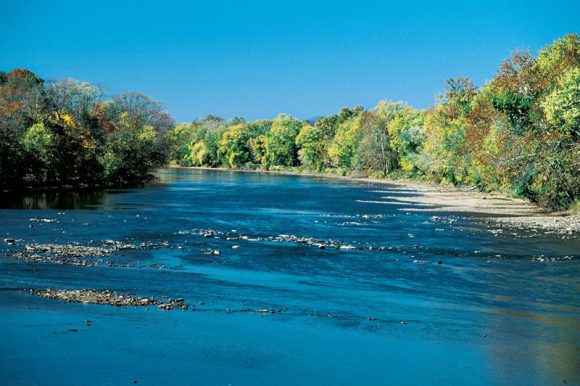
The Raritan River.
The Rutgers Raritan River Consortium (R3C) has awarded a combination of eleven mini-grants and internships to support research by Rutgers faculty, staff and post-doctoral researchers on Raritan River, basin and bay resource issues. This is the 2nd year of the program to support work by Rutgers affiliates in the Raritan Region. Projects and recipients include:
- “Temporal Heavy Metal Distribution and Bioaccumulation in the Lower Raritan River” — Kaizuan Bu, Dept. Marine & Coastal Sciences, and Jeffra Schaefer Dept. Environmental Sciences, both from the School of Environmental and Biological Sciences (SEBS)
- “Tracking Genes and Bacteria Responsible for Organohalide Reduction in the Raritan River Basin” — Donna E. Fennell, Dept. Environmental Sciences (SEBS)
- “Status of Forests in the Lower Raritan Watershed” — Jean Marie Hartman, Dept. Ecology, Evolution and Natural Resources (SEBS)
- “Quantifying Fish Movement and Phenology on the Raritan River” — Olaf P. Jensen, Dept. Marine & Coastal Sciences (SEBS)
- “Plastics in the Raritan River” — Jill Lipoti and Mary Nucci, Dept. Human Ecology (SEBS), Beth Ravit, Center for Urban Environmental Sustainability (SEBS), Kristi MacDonald, Raritan Headwaters Association
- “Assessment of Protection Strategies for Estuarine Beaches: A Case Study of Cliffwood Beach” — Karl Nordstrom, Dept. Geography, School of Arts and Sciences (SAS) and Jonathan Miller, Dept. Marine & Coastal Sciences (SEBS)
- “Influence of Raritan River Spring Discharge on Mercury Bioaccumulation in Raritan Bay” — John Reinfelder, Jeffra Schaefer and Philip Sontag. Dept. Environmental Sciences (SEBS) and Grace Saba, Dept. Marine & Coastal Sciences (SEBS)
- “Providing Data on Discards and Fishery Dynamics to Inform Management Policy of the Recreational Summer Flounder Fishery in Raritan Bay” — Douglas Zemeckis, Dept. Agriculture & Natural Resources (SEBS)
- “Raritan Basin Weather and Climate Monitoring and Information Access” David A. Robinson, Dept. of Geography (SAS), New Jersey State Climatologist
- “Understanding the Benefits and Risks of Coastal Flood Hazard Adaptation Strategies for Water-Dependent Uses in the Raritan Bay ” — Matthew Campo, Environ. Analysis & Communications Group, Edward J. Bloustein School of Planning and Public Policy (EJB)
- “Digital Raritan River – A Pilot Study on Creating a Rich Digital Environment to Support Resilience Centered Investigations in the Raritan River Region” — Jie Gong, Dept. Civil and Environmental Engineering, School of Engineering, and Jennifer Whytlaw, Environ. Analysis & Communications Group (EJB)
Rutgers faculty, staff and post-doctoral researchers (with faculty advisor) were eligible to apply. Proposals that included a strong education component or that demonstrated collaboration with external Raritan stakeholders and/or collaboration between Rutgers schools and programs were given preferential consideration. The award-related work is to be conducted between December 1, 2017 and August 31, 2018.
For more information about the recipients and their Raritan based projects, see the Rutgers Raritan River Initiatives Website.
The R3C Mini-grant and Internship Pool program encourages collaboration between Rutgers affiliates and stakeholders throughout the Raritan basin to address research, public information, and planning needs and to promote best management practices for a more sustainable Raritan River, basin and bay. This program is made possible with funding from Rutgers Chancellor Deba Dutta, and with the support of Dean Michael Greenberg (EJB), Dean Robert Goodman (SEBS) and the Johnson Family Chair for Water Resources and Watershed Ecology.
The R3C is a collaborative effort of Rutgers New Brunswick-Piscataway schools, programs, and departments that have joined together to advance Rutgers’ mission to be a better steward of the Raritan River and its environs. The R3C has two primary goals: to utilize the Raritan River and its environs to inform university-based education, research and scholarship; and to apply Rutgers’ efforts, research and programs to collaborate with other Raritan partners to advance improvements in regional planning, policy and decision-making that positively affect the Raritan region and resources. By facilitating collaboration among Rutgers faculty, staff and students and engaging the greater Raritan community of businesses, municipalities, NGOs and other Raritan stakeholders, the R3C will bring the university’s resources to bear to address concerns for the Raritan.
To learn more about the R3C, the mini-grants and internship pool, or the other Rutgers Raritan River initiatives, visit the website or contact Sara Malone at sjmalone@ejb.rutgers.edu.

